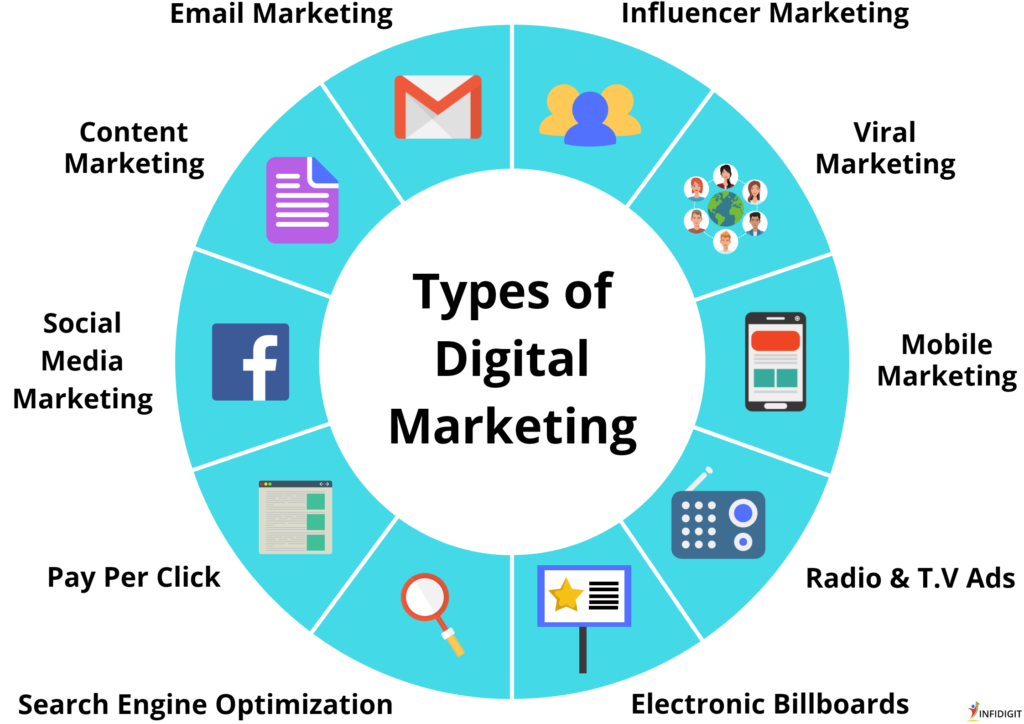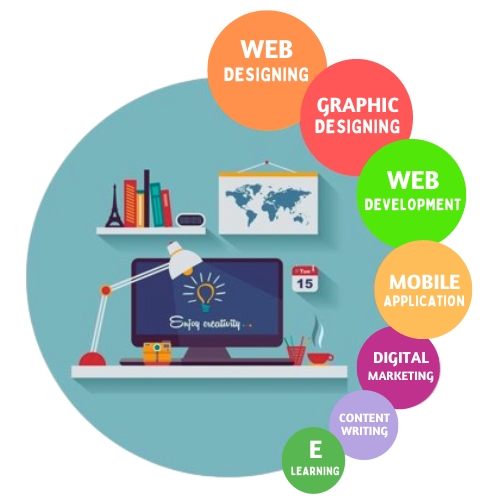Digital marketing in 2024 focuses on internet and digital channels for promoting products and services.Key trends include the significant role of AL and ML in personalizing marketing efforts. Video content gains prominence, with platforms like youtube and tiktok offering engagement opportunities . In today’s hyper-connected world, consumers rely heavily on digital channels to research products, compare options, and make purchasing decisions. This shift in consumer behavior has led to the rise of digital marketing, a dynamic field focused on promoting brands and products through online channels.
Search Engine Optimization (SEO)
Optimizing website content and structure to improve organic search ranking and visibility on search engines like Google.
Search Engine Marketing (SEM)
Utilizing paid advertising on search engines to reach a targeted audience with relevant search queries.
Content Marketing
Creating and sharing valuable, informative content (blogs, articles, videos) to attract and engage a target audience.
Social Media Marketing
Leveraging social media platforms like Facebook, Instagram, and Twitter to connect with potential customers, build brand awareness, and drive traffic to your website.
Email Marketing
Building email lists and sending targeted email campaigns to nurture leads, promote products, and foster customer relationships.
Mobile Marketing
Reaching customers through their mobile devices with SMS marketing, mobile app marketing, and location-based marketing.
Types of Digital Marketing
- Email marketing is an effective way to capture high – quality leads and convert them to customers by sending personalized emails to the targeted audience .
- affiliate marketing is an effective way to digital marketing that involves a merchant paying commission to one or more affiliates .
- social media marketing involves creating different types of content for various social media platforms in order to promote products and services .
- content marketing is an effective marketing technique of creating and distributing valuable online content [ like videos , blogs , etc ] to the targeted audience


Current SEO trends:
- E-E-A-T focus: Content by experienced authors.
- Search intent matters: Target user needs, not just keywords.
- AI for content creation: Use AI tools to assist, not replace, writing.
- User experience is key: Fast loading, mobile-friendly sites rank higher.
- Voice search optimization: Optimize content for conversational queries.
Market Research and Audience Segmentation: Charting the Customer Landscape
- Market Research: The foundation of understanding your target audience lies in market research. This involves gathering information about your potential customers, their needs, wants, and behaviors. Here are some effective market research methods:
- Surveys and Questionnaires: Distribute online surveys or questionnaires to gather insights directly from your target audience. This allows you to collect data on demographics, interests, pain points, and preferred communication channels.
- Website Analytics: Leverage website analytics tools like Google Analytics to understand user demographics, website behavior, and browsing patterns. Analyze traffic sources, popular content, and conversion rates to gain insights into your existing audience.
- Social Media Listening: Monitor social media conversations relevant to your industry and brand. Tools like Brandwatch or Sprout Social can help you track brand mentions, analyze audience sentiment, and identify emerging trends.
- Competitor Analysis: Research your competitors to understand their target audience, messaging, and marketing strategies. This can provide valuable insights into potential customer segments you may be overlooking.
- Audience Segmentation: Once you’ve gathered market research data, segment your audience into distinct groups based on shared characteristics. This allows you to tailor your marketing messages and strategies for each segment, maximizing campaign effectiveness. Here are some common segmentation criteria:
- Demographics: Age, gender, income level, location, education level, etc.
- Psychographics: Interests, values, lifestyle choices, personality traits, etc.
- Behavioral: Buying habits, online behavior, product usage patterns, etc.
- Needs and Pain Points: What problems are your customers facing? How can your product or service address them?
Setting SMART Goals: The Foundation for Effective Marketing
Setting SMART Goals
The Foundation for Effective Marketing
Examples of SMART Goals
Digital Marketing
- Increase website traffic by 15% from organic search within the next 6 months.
- Generate 100 qualified leads through email marketing campaigns in the next quarter.
- Achieve a 2% conversion rate on product pages within the next year.
- Increase brand awareness on social media by 30% as measured by follower growth and engagement metrics within the next 4 months.
Choosing the Right KPIs
Measuring What Matters Most
Once you’ve established your SMART goals, identify the key performance indicators (KPIs) that will help you measure progress. KPIs are quantifiable metrics that track the effectiveness of your digital marketing efforts. Here are some common KPIs categorized by marketing objective
Developing a Comprehensive Strategy
Developing a Comprehensive Strategy
The key to success in digital marketing lies in a well-defined, multi-channel strategy. This section explores some of the core elements you need to consider when crafting your digital marketing roadmap:
Content Marketing Strategy
The Power of Valuable Content
Content marketing is the cornerstone of any successful digital marketing strategy. Here’s how to create a content marketing strategy that attracts, engages, and converts your target audience.
Content Creation and Distribution Plan
Content Creation and Distribution Plan
Content Audit: Evaluate your existing content to identify strengths, weaknesses, and potential gaps.
Content Calendar: Develop a content calendar that outlines the types of content you’ll create (blog posts, infographics, videos, etc.), topics you’ll address, and publishing schedule.
Marketing Objectives
Brand Awareness
Website traffic
Social media follower growth
Brand mentions and sentiment analysis
Public relations coverage
Website Traffic
Organic search traffic
Referral traffic
Direct traffic
Bounce rate
Average time on page
Lead Generation
Number of leads generated
Cost per lead (CPL)
Lead conversion rate
Sales & Conversion
Website conversion rate
Customer acquisition cost (CAC)
Customer lifetime value (CLTV)
Selecting the Right
Align with Goals: Choose KPIs directly tied to your SMART goals.
Actionable Insights: Focus on KPIs that provide actionable insights to optimize your campaigns.
Platform Selection and Optimization
Align with Goals: Choose KPIs directly tied to your SMART goals.
Actionable Insights: Focus on KPIs that provide actionable insights to optimize your campaigns.
SEO Tactics for Visibility
1. On-Page Optimization: Fine-tune your website’s elements to improve search engine ranking and organic traffic:
Keyword Research: Identify relevant keywords with high search volume and low competition.
Content Optimization: Optimize website content (title tags, meta descriptions, headings) with target keywords while maintaining readability.
Image Optimization: Include relevant keywords in image alt tags and file names.
Technical SEO: Ensure your website is mobile-friendly, has a fast loading speed, and has a clean and well-structured code.
2. Off-Page Optimization and Link Building: Earn backlinks from high-quality websites to boost your website’s authority and credibility:Guest Blogging: Contribute high-quality articles to relevant industry blogs with backlinks to your website.
Directory Submissions: Submit your website to reputable online directories.
Broken Link Building: Find broken links on relevant websites and suggest your content as a replacement.
Implementing Effective Tactics
Mastering the Search Engine Game: SEO Tactics for Visibility
- On-Page Optimization: Fine-tune your website’s elements to improve search engine ranking and organic traffic:
- Keyword Research: Identify relevant keywords with high search volume and low competition.
- Content Optimization: Optimize website content (title tags, meta descriptions, headings) with target keywords while maintaining readability.
- Image Optimization: Include relevant keywords in image alt tags and file names.
- Technical SEO: Ensure your website is mobile-friendly, has a fast loading speed, and has a clean and well-structured code.
- Off-Page Optimization and Link Building: Earn backlinks from high-quality websites to boost your website’s authority and credibility:
- Guest Blogging: Contribute high-quality articles to relevant industry blogs with backlinks to your website.
- Directory Submissions: Submit your website to reputable online directories.
- Broken Link Building: Find broken links on relevant websites and suggest your content as a replacement.
Building Relationships and Fostering Engagement on Social Media
- Creating Shareable Content: Craft compelling and informative content that resonates with your target audience and encourages them to share it with their networks:
- Visual Content: Utilize images, infographics, and videos to grab attention and increase engagement.
- Interactive Content: Host polls, quizzes, or contests to encourage audience participation.
- Trending Topics: Capitalize on trending topics and industry news to stay relevant.
- Engaging with Followers and Responding to Comments: Foster a sense of community and build relationships with your audience:
- Respond to Comments: Promptly address questions, comments, and concerns to demonstrate responsiveness and value audience feedback.
- Run Social Media Contests and Giveaways: Encourage participation and brand awareness through interactive campaigns.
- Host Live Q&A Sessions: Connect directly with your audience in real-time and answer their questions.
Measuring Performance and Analyzing Data
The true power of digital marketing lies in its measurability. Unlike traditional marketing methods, digital campaigns allow you to track performance in real-time and gain valuable insights to optimize your strategies for success.
Equipping Yourself: Tools for Tracking and Analytics
A robust set of analytics tools is essential for measuring performance and analyzing data in digital marketing. Here are some key tools you’ll need:Website Analytics: Google Analytics is the industry standard for website traffic analysis. It provides comprehensive data on website visitors, traffic sources, user behavior, and conversions.Social Media Analytics: Most social media platforms offer built-in analytics tools that track follower growth, engagement metrics (likes, comments, shares), and campaign performance.Email Marketing Analytics: Email marketing platforms provide data on email open rates, click-through rates, conversion rates, and unsubscribes, enabling you to gauge campaign effectiveness.SEO Tools: SEO tools like SEMrush or Ahrefs help you track website ranking for target keywords, identify competitor strategies, and monitor backlinks. Paid Advertising Analytics Platforms: Both Google Ads and social media advertising platforms offer detailed analytics on campaign performance, allowing you to track impressions, clicks, conversions, and cost-per-acquisition (CPA).
Interpreting Key Metrics and Performance Indicators
Website Traffic Metrics:
Unique Visitors: The number of individual visitors to your website within a specific timeframe. Page Views: The total number of times a page on your website is loaded. Bounce Rate: The percentage of visitors who leave your website after viewing only one page. A high bounce rate indicates a need to improve website content or user experience. Average Time on Page: The average amount of time visitors spend on a webpage.
Engagement Metrics
Lead Generation: The number of leads generated through website forms, landing pages, or social media campaigns. Conversion Rate: The percentage of visitors who take a desired action on your website (e.g., making a purchase, signing up for a newsletter).By analyzing these metrics in conjunction with your SMART goals and KPIs, you gain valuable insights into the effectiveness of your digital marketing strategies.
Staying Updated with Trends and Innovations
The digital marketing landscape is constantly evolving. New technologies emerge, consumer behavior shifts, and industry best practices adapt. To stay ahead of the competition and ensure your marketing strategies remain effective, continuous learning and adaptation are crucial. Here’s how you can stay updated with the latest trends and innovations
Industry News and Developments
Industry Publications and Blogs: Subscribe to reputable digital marketing publications and blogs to stay informed about the latest trends, case studies, and expert insights. Social Media Groups and Forums: Join online communities and forums dedicated to digital marketing. Engage in discussions with industry professionals and learn from their experiences. Podcasts and Webinars: Many marketing agencies and industry leaders offer free podcasts and webinars covering a wide range of digital marketing topics.
Experimenting with New Tools and Technologies
Explore Emerging Technologies: Stay curious and explore emerging technologies like artificial intelligence (AI), augmented reality (AR), and virtual reality (VR). Consider how these technologies can potentially be integrated into your marketing campaigns to enhance user experience and engagement. Test New Marketing Tools: Continuously evaluate new marketing tools and platforms that can streamline your workflows, improve campaign performance, or provide deeper audience insights.
By actively following these practices, you can cultivate a culture of continuous learning within your organization. This ensures your digital marketing strategies remain innovative, adaptable, and well-positioned to thrive in the ever-evolving digital marketing landscape.
Crafting Your Digital Marketing Success Story
The digital marketing landscape presents a wealth of opportunities to connect with your target audience, build brand awareness, and achieve your business objectives. By following the steps outlined in this comprehensive guide, you’ll be well-equipped to develop a strategic roadmap, implement effective tactics, and measure your results to achieve measurable success. Remember, the key lies in understanding your target audience, crafting compelling content, leveraging the right channels, and continuously optimizing your strategies based on data and analytics.

About the Author:15 years of experience making websites (Website design, SEO, Digital Marketing, WordPress, Drupal, ERP, Google Services, Applications development, Logo design, AWS Services, Apps development, IOS, Android, Web Hosting & CRM etc….) If you want to find out more about us, you can look us up on Google.
FAQS
A successful digital marketing strategy involves a mix of various components, including search engine optimization (SEO), content marketing, social media marketing, email marketing, pay-per-click (PPC) advertising, and analytics. Each component plays a crucial role in reaching and engaging with the target audience effectively.
Content marketing involves creating and sharing valuable, relevant content to attract and engage a specific audience. Businesses can leverage content marketing by producing high-quality blog posts, articles, videos, infographics, and other types of content that address the needs and interests of their target audience. By consistently delivering valuable content, businesses can build brand authority, drive traffic to their website, and nurture leads through the sales funnel.
Social media marketing involves using social media platforms to connect with and engage target audiences. Businesses can leverage social media marketing to build brand awareness, foster customer relationships, drive website traffic, and generate leads. By creating compelling content, interacting with followers, and utilizing targeted advertising options, businesses can effectively reach their audience and achieve their marketing objectives through social media.
SEO is essential for improving a website’s visibility in search engine results pages (SERPs) and driving organic traffic. By optimizing website content, meta tags, images, and other elements for relevant keywords and improving site structure and performance, businesses can enhance their search engine rankings and attract more qualified traffic. SEO also plays a crucial role in improving user experience and increasing website credibility, ultimately leading to higher conversion rates and business growth.
- Digital Marketing Services
- Brand Consultancy
- Website Design Services
- Web Hosting & Domain Registration in India
- Dynamic Website Development
- Website Redesign Service
- Website Maintenance Service
- AMC & IT Support
- Ecommerce Website Design Services
- SSL Certificate (HTTPS)
- Content Writing
- Complete Email Service
- G Suite Services
- Microsoft Office 365 Email Services
- Zoho Email Services
- ERP Bangalore
- Custom Web Application Development
- Mobile App Development and Services
- Android Application Development
- iOS Application Development
- Windows Application Development







